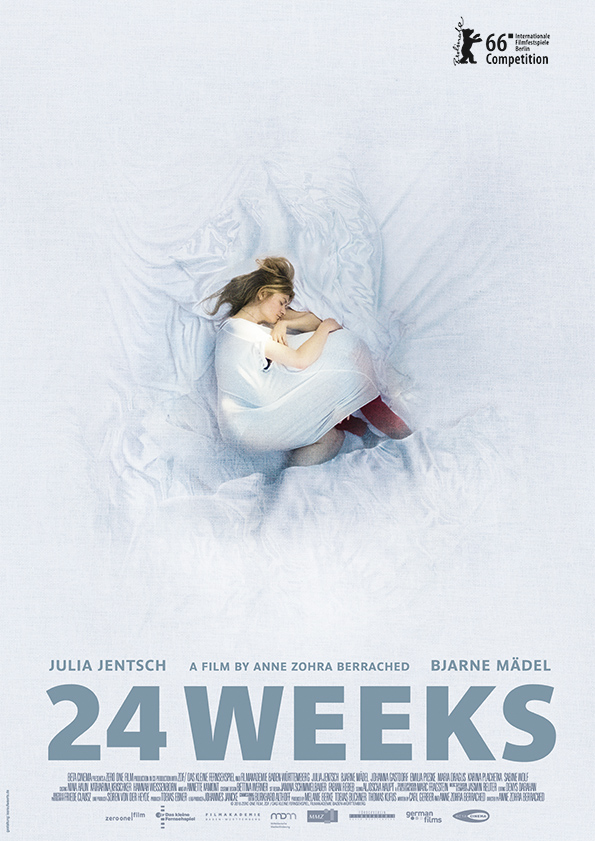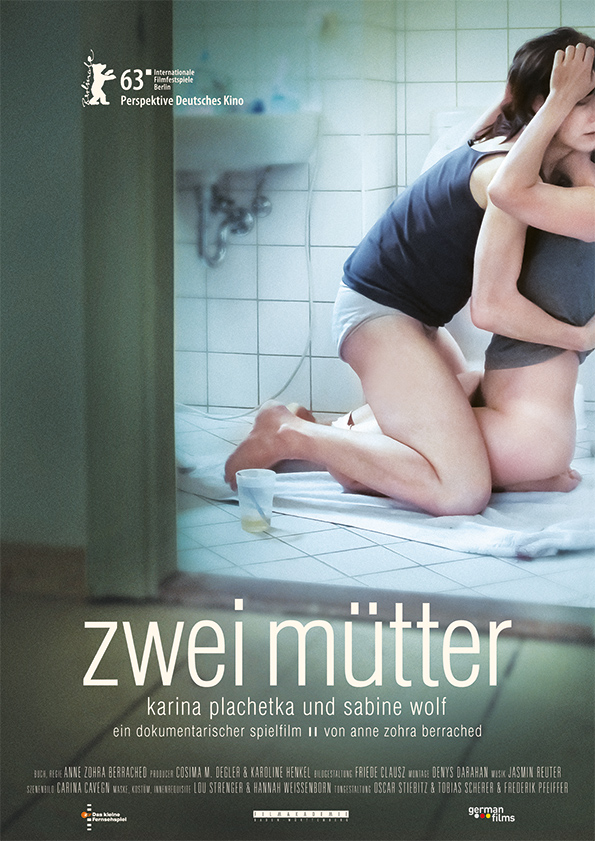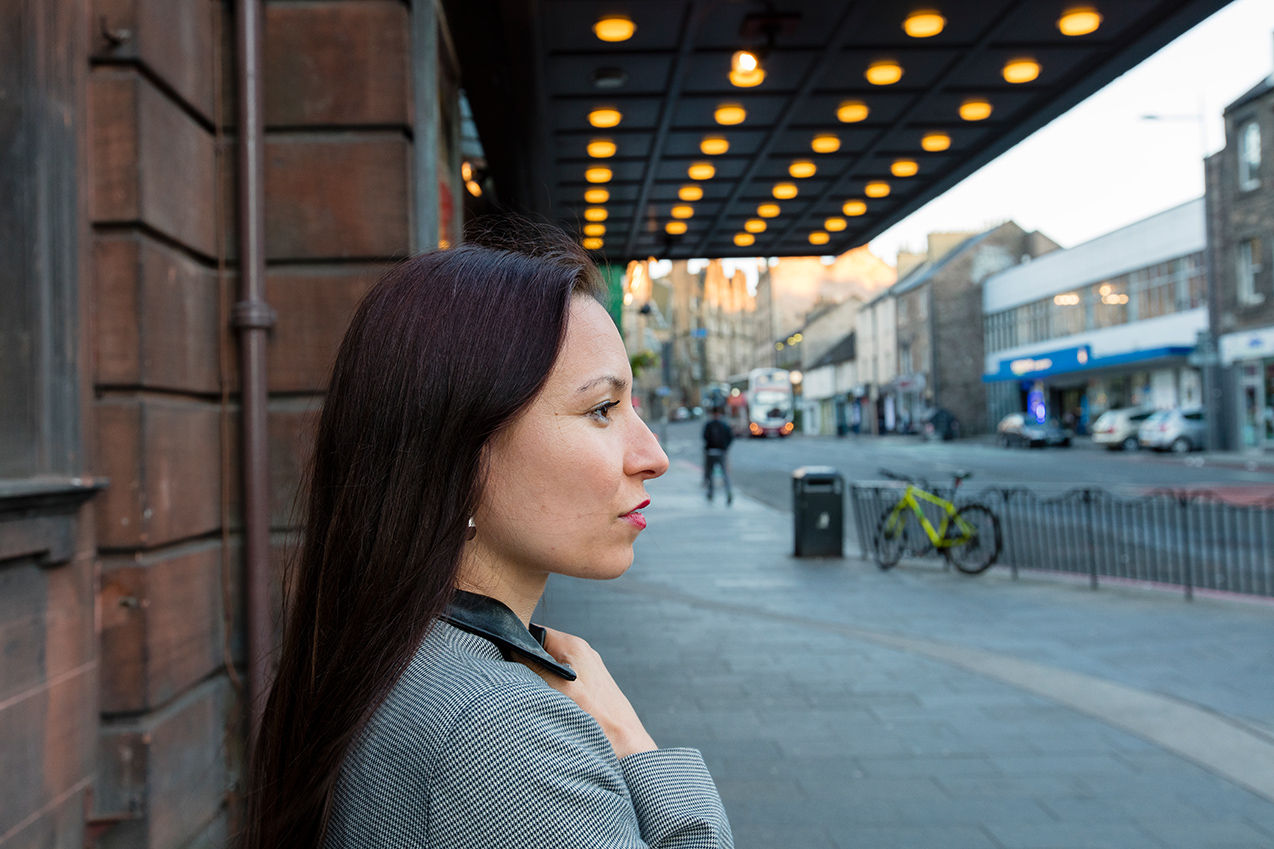A PORTRAIT OF DIRECTOR ANNE ZOHRA BERRACHED
photo © Kevan SmithActually, Anne Zohra Berrached had expected to face opposition when her film 24 WEEKS ran in the competition of the Berlinale 2016. At least from part of the audience. After all, it deals with a subject that divides society into two camps, even outside the cinema: cabaret artist Astrid and her husband Markus – brilliantly played by Julia Jentsch and Bjarne Mädel – discover in Astrid’s sixth month of pregnancy that their child will be born with Down’s syndrome and a serious heart defect. The film accompanies the couple throughout the tortuous, difficult process of deciding whether to carry the unborn child to full term or undergo an abortion – which is permitted in Germany until shortly before the birth in case of corresponding medical indications.
Anne Zohra Berrached brings everything painfully close to the viewers, and in great detail. She does not spare them the injection that ultimately kills the foetus in Astrid’s womb or Astrid’s face when she brings her child dead into the world afterwards. “We had really expected the viewer to lose all empathy with the main character when she aborted her child in the sixth month,” recalls the director on the balcony of her apartment in Berlin-Kreuzberg.
Amazingly, she was to be proved quite wrong there: the film, which has now sold in sixteen countries, has actually been received with unanimous approval. Even in those places with considerably less flexible abortion laws than in Germany, or where abortions are illegal. “People have tended to feel with the film’s protagonists rather than judging intellectually,” Berrached tells herself as an explanation for this phenomenon. “I believe that we succeeded in making the film so that no side could condemn it, but no side could misappropriate it for their own arguments, either.


IN short, with 24 WEEKS the director succeeds in the feat of getting viewers to ask themselves the morally difficult question: “What would I do if I was in the leading character’s situation?”
We might even be justified in referring to this as Berrached’s trademark: born in Erfurt in 1982 as the daughter of a German mother and an Algerian father, she is definitely one of those artists who do not moralize or make judgements. Instead, she shows things as they are – with maximum complexity and with a sometimes positively unbearable precision.
Logically, to succeed in this you need to be a free-thinker, both behind and away from the camera: Berrached, who lives in Kreuzberg on a street populated with numerous in-bars, feels as much at home on the red carpet as she does in the district’s “unregulated” night life. “I need to keep experiencing the world as a loud and intense place. How else would I tell its stories?,” she says with a laugh. Now and then, the 34-year-old reports, she can be seen in her pink mini-skirt in “notorious Berlin clubs”. “I think it’s fantastic that there are places here where it’s possible for a load of weird guys to crawl around on the floor naked, or someone to suddenly appear in front of you holding his penis.”
Extreme alertness and a vital hunger for experience are not Berrached’s only assets, however. “I think that sometimes I’m very pushy indeed,” she explains. “I simply will not give up until the result is just as I imagined it!” In 24 WEEKS, for example, many of the parts were not given to actors for reasons of authenticity. The doctors and midwives participating in the film actually work in those professions; they play themselves. For this, Berrached invited up to fifty people to castings – per part! A gigantic effort – which can also be seen clearly in the outcome, however. After all, the director believes there is nothing worse than dialogues that seem contrived, artificial poses, or sentences simply recited.
Even during her studies at the Filmakademie Baden-Württemberg, she put her whole heart and soul into her art. “I’m pretty sure that I wasn’t a very congenial fellow student,” the avowed outsider admits straight out. She obviously has no interest in window dressing, even when it concerns her own person. “While the others got together in the evenings to chat, I was working on my films.” Or watching other films – nationally, Berrached admits to being a fan of her colleagues Maren Ade and Christian Petzold, “because they think everything through with such incredible precision and in absolute detail.” Internationally, she particularly likes Iranian and Rumanian cinema, “because what a director like Asghar Farhadi or an author like Răzvan Rădulescu is doing is so utterly intelligent, with absolutely no respect for conventions.”

Anne Zohra Berrached (photo © Kevan Smith)
IN fact, Berrached pays a high price for her zeal: she puts herself under such pressure to work and succeed that she repeatedly develops a serious skin condition. “I am always getting something, then I fly over to India, where a guru gets rid of it and warns me that I should be working less,” she reveals casually. At least she is suitably rewarded – it should prove very hard to emulate the way that Berrached has taken off!
Her first full-length film TWO MOTHERS, about a lesbian couple wanting to have a child, which she made during her third year of study, won a prize in the section Perspektive Deutsches Kino at the Berlinale in 2013. And three years later, 24 WEEKS – her graduation film – was the only German entry to make it into the competition of the Berlinale!
And, by the way, Berrached already completed a course in Social Paedagogics and lived for periods in London and Madrid before coming to the film world. And that came about in a rather interesting way: she once accompanied an actor she knew to a shooting session, observed the director there, and thought – being the way she is: “I can do that better!”
Berrached’s next film will be about a very special love story: the protagonist is based on a real woman, who – unsuspectingly – discovered after the attack on the World Trade Center on September 11th 2001 that her husband was one of the four pilots. And of course Berrached would not be Berrached if her work did not lead again to some extremely productive material for discussion!
Christine Wahl

